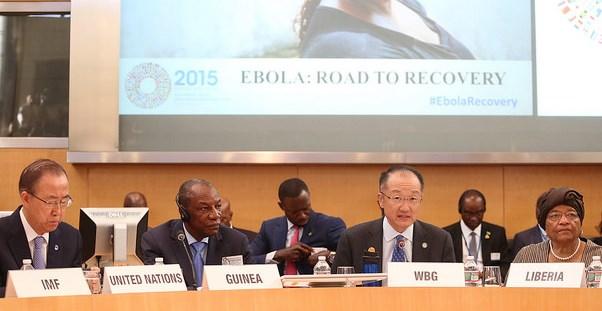At an Ebola summit at its spring meeting in Washington, DC, today, the World Bank Group announced that it will provide at least $650 million over the next 12 to 18 months to help Guinea, Liberia, and Sierra Leone recover, while providing new estimates of the epidemic's impact.
In other developments today, top-level World Health Organization (WHO) officials vowed to take up reforms suggested by its executive board in the wake of the outbreak, and Doctors without Borders (MSF) handed over a key Ebola treatment unit (ETU) in Monrovia to Liberia's health ministry.
Economic pictures vary by country
In a statement today, the World Bank said the new pledge boosts its overall total for Ebola response and recovery to $1.62 billion. Priorities include strengthening health systems, agriculture, education, cash transfers and other social protection programs, and lifesaving infrastructure such as electricity, water, sanitation, and roads.
The World Bank said the funds also target the development of a regional disease surveillance system across West Africa to prevent or contain future disease outbreaks.
Jim Yong Kim, MD, PhD, World Bank president, said in the statement, "Many of us have acknowledged that the international community was slow to react to Ebola. Let's show that we have learned this lesson by supporting an effective and sustainable recovery that also prepares these countries—and the rest of the world—for the next pandemic."
The announcement came alongside new World Bank gross domestic product (GDP) estimates revealing that the Ebola outbreak continues to hobble the economies of the three countries, but to dramatically varying degrees. Estimated losses in 2015 rose to $2.2 billion for the three countries: $240 million for Liberia, $535 million for Guinea, and $1.4 billion for Sierra Leone.
Ebola-related devastation in the three countries has been worsened by an economic decline caused by a steep drop in global prices for iron ore, as well as the collapse of Sierra Leone's mining sector.
Key differences in the three countries' economic situations have emerged since the World Bank's last economic update for the region in January. It said Sierra Leone faces a severe recession and an unprecedented 23.5% negative grow rate because of financial issues stemming from the shuttering of iron ore mining. The group added that Guinea's economy is stagnant, with a 0.2% negative growth rate for 2015, while Liberia's GDP level is gradually returning to normal, with a projected growth rate of 3%, but below the pre-Ebola estimate of 6.8%.
Countries spell out needs, plans
Presidents from the three outbreak countries are requesting that international donors cancel their debts and contribute $5 billion to $6 billion over the next 2 years to help rebuild their economies, Sierra Leone's president, Ernest Bai Koroma, told Reuters yesterday.
Koroma said he wants Kim to fulfill a promise made last year to take steps to ensure reconstruction on the scale of the Marshall Plan that rebuilt Europe after World War II.
His comments came as the African leaders were in Washington presenting their plans for recovery to the World Bank during the Ebola summit.
WHO welcomes reform
Meanwhile, a joint statement yesterday by the WHO's director-general, deputy director-general, and regional directors weighed in on the Ebola outbreak and response, as well as reforms recently put forward for its future work in public health emergencies.
They said the outbreak was a reminder that the world, including the WHO, is ill prepared for a large, sustained disease outbreak. The group welcomed WHO executive board proposals in late January, especially the ones that address WHO response, noting that the lessons learned and commitment to reforms "will enable WHO to play its rightful place in disease outbreaks, humanitarian emergencies, and in global health security."
In the statement, the group said it has learned the lessons of humility, health system fragility, the importance of response capacity, engaging communities and culture, shared responsibility for surveillance and information, coordination, the importance of addressing neglected diseases, and the need to communicate risks early and clearly.
They vowed to take on the executive board's suggestions, which included a global health emergency workforce and a contingency fund to allow the WHO to respond more rapidly to disease outbreaks.
Also, the officials pressed world leaders to take disease threats seriously and to sustain their efforts to help West Africa snuff out the outbreak and recover key services and systems that were devastated by the event.
Other developments
- MSF today announced that it handed over the ELWA 3 ETU in Monrovia to Liberia's health ministry, which will use it as a temporary ETU. MSF closed and decontaminated the facility on Mar 25 after cases dropped off in Liberia. At the outbreak's peak, the center had 250 beds and was the largest ETU ever built. Of 1,917 patients admitted to ELWA 3, 801 died and 512 recovered. It now has 30 beds, which can be increased to 60 beds, if needed. Mariateresa Cacciapuoti, MSF's emergency coordinator for Liberia, said the handover is emotional for MSF. "ELWA3 has been the symbol of a long and incredibly difficult battle against Ebola."
- The WHO today said the number of confirmed, probable, and suspected Ebola cases in the three countries has increased to 25,855, including 10,702 deaths. The totals reflect an increase of 64 cases and 13 deaths since the WHO's weekly epidemiologic update on Apr 15. The numbers include data from Guinea and Sierra Leone as of Apr 15 and Liberia as of Apr 11.
See also:
Apr 17 World Bank statement
Apr 16 Reuters story
Apr 16 WHO joint statement on Ebola response
Jan 26 CIDRAP News story "WHO executive board approves Ebola reform proposals"
Apr 17 MSF press release
Apr 17 WHO update


















